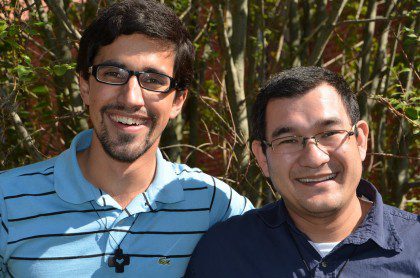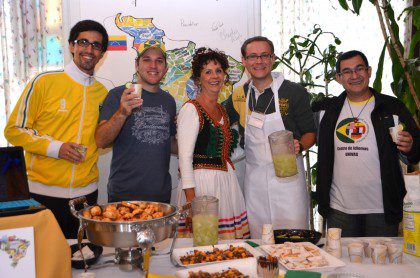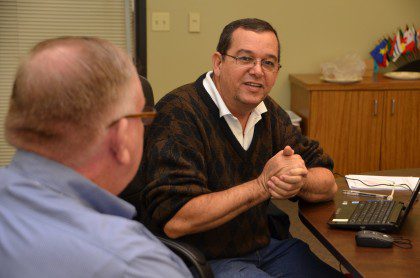
Preparing for religious life and the missions
“Just as Jesus sent people two by two, we are sent to share the Gospel in the Philippines,” said Frater Sergio Matumoto, SCJ.
Sergio, along with fellow classmate, Frater Jonathan Schneiders, SCJ, have been sent together by the Central Brazilian Province to join the SCJ mission in the Philippines.
Their first stop on the way to Asia was Sacred Heart School of Theology in Hales Corners, Wis., where they spent several months in the ESL (English as a Second Language) program. They are now in Davao, a city in the southern part of the Philippines, where they are studying Tagalog, one of the indigenous languages of the country. In June they will begin their theology studies.
“We are preparing to be ordained for the mission that we will serve,” said Jonathan.
English will be the primary language for study, but Tagalog will allow the seminarians to do pastoral ministry.
“Pastoral ministry is the best part of formation!” said Jonathan with enthusiasm. “When we were in formation in Brazil we always did weekend ministry, even in novitiate. It is how we learn to be a priest and a religious in a concrete way, in a practical way.”
“I enjoyed pastoral ministry in Brazil,” said Sergio, “but I am excited to do it in another country and to learn about another culture.”
For both, a call to the missions has gone hand in hand with their call to religious life and the priesthood. “I always wanted to serve the missions,” said Jonathan. “I want to know other cultures.”
“Since the beginning, I asked my superiors about going to the missions,” said Sergio. “I was persistent,” he added, laughing a bit and admitting that perhaps “I bothered them a bit about it.”
Whenever a missionary would come home to Brazil to visit he would spend time with the students and talk about his work and the people with whom he ministered.
“Each time I heard one of these missionaries speak, my desire for the missions grew,” said Jonathan. “Always I thought, ‘I want to be like him!’ They were so happy, so full of life. I wanted to know their secret. It seemed like the happiest religious were those serving in the missions. They filled me with enthusiasm.”
It has taken a bit of time for Jonathan’s and Sergio’s families to understand their sons’ enthusiasm for not only the missions, but religious life itself.
“My father had my whole life planned for me,” said Jonathan. And those plans did not include a vocation to the priesthood or religious life. Jonathan’s brothers all had careers in the military. His father planned on him following in their footsteps, or perhaps studying law in preparation for elected office.

“From the time that I was 12 I felt that I had a vocation but I respected my father so I did not speak about it at first,” said Jonathan. But eventually, he decided that even though he respected his father, he had to follow his heart. After high school he looked at several religious communities.
“But none of them seemed to fit my vocation; I started to think that I would have to found my own religious community,” he said. “Maybe I didn’t even have a vocation.”
But then he learned about the Priests of the Sacred Heart “and everything clicked!” he said. Even Fr. Dehon’s history was similar to Jonathan’s. His father was against his vocation and wanted him to study law.
Sergio was a young adult when he decided to follow his vocation. He came to know the Priests of the Sacred while he was in college, studying math. “I prayed with them on Saturdays and started to learn about Fr. Dehon,” he said. “When I heard about the community’s missions in Africa I became excited and wanted to deepen my relationship with the community. I believe, as Fr. Dehon said, that missionary activity is a privileged form of apostolic service.”
Just as with Jonathan, and Fr. Dehon, Sergio’s father was not initially in favor of his vocation. “But my mother supported it,” he said.
Now that his vocation is taking him halfway around the world, both parents, as well as his siblings, wonder what Sergio is getting himself into.
“They ask me, ‘Couldn’t you live your vocation close to home?’” said Sergio. “They don’t understand it, but I tell them that this is my vocation. To be a missionary is my vocation.”
Friends and family tease Jonathan and Sergio about their upcoming assignment. “Every day I open my email and someone has sent me a photo or news story of a natural disaster in the Philippines,” said Jonathan. “They tease me about giant crocodiles and other crazy things. I just laugh. You can encounter difficulties anywhere, and not just crocodiles!”
Both SCJs said that they were very grateful for their experience in the ESL program at Sacred Heart School of Theology. “We improved our English,” said Jonathan, “but more importantly we experienced some of the many cultures of the congregation. Being here in the ESL program was the best preparation we could have had. ESL is the perfect place to learn about the congregation and about living in another culture. Here, it is like a ‘little picture’ of the congregation. In the morning I would have breakfast with someone from Indonesia and at lunch I would sit at a table with SCJs from Poland.
“I am a much better person because of my time here and I have a better idea of what it means to be an SCJ, not just an SCJ from Brazil.”

On to the Philippines
In late September Fr. Jose Benedito de Morases Machado (“Bene”), SCJ, district superior of the Philippines, and Fr. Francis Pupkowski, SCJ, the district’s development director, came to the United States for a visit. One of the reasons for the trip was to update the Provincial Council on the ministries and goals of the district. The U.S. Province has supported it with personnel for English studies (Fr. Bernie Rosinski, SCJ, spent several weeks there as an ESL instructor this year), retreats, and administrative issues, as well as with continued financial support. The province also assisted the Philippines in setting up its development program, including a send-money grant of $250,000.
Frs. Bene and Francis timed their visit so that they could meet with and accompany Jonathan and Sergio to their new home in the Philippines. Normally, said Fr. Bene, the district only accepts ordained SCJs to join the district (with the exception of members of the district’s own formation program which includes candidates, novices and professed students from other Asian countries). However, Fr. Bene was impressed by the students’ enthusiasm.
Fr. Bene met Sergio when he was visiting the Central Brazilian novitiate last year. Sergio told him that he wanted to be a missionary and asked if it would be possible for him to go to the Philippines. Initially, there was reluctance to send a young SCJ who hadn’t even begun theology studies to a mission country. But eventually, hesitation turned into enthusiasm. Soon, Jonathan entered into the equation as well and it was decided that the two would go together to the Philippines.
Jonathan and Sergio will join a rapidly growing district; they will have plenty of company in the formation program. Currently there are nine Filipinos in theology and 35 in philosophy, along with several postulants and novices.
And they will study in a country that highly values education. “I have never seen education placed in such high regard as I have in the Philippines,” said Fr. Bene. “Even in the poorest of areas, places where the people practically live in boxes next to trash dumps, the students come to school well-scrubbed and ready to learn. Always the most beautiful place in a community is chosen for the school. And graduation is a big event. I think that even kindergarten graduation in the Philippines is a bigger event than college graduation in Brazil!”
“We look forward to studying in such an environment,” said Jonathan.
